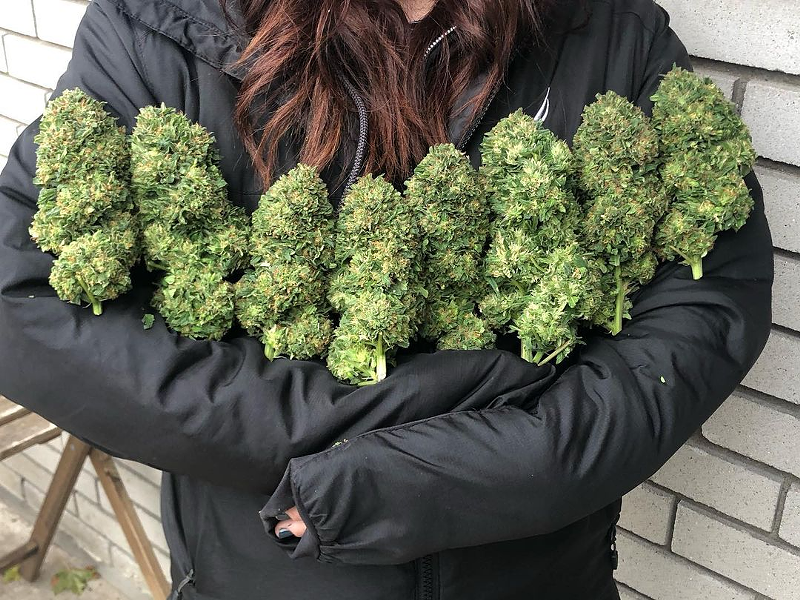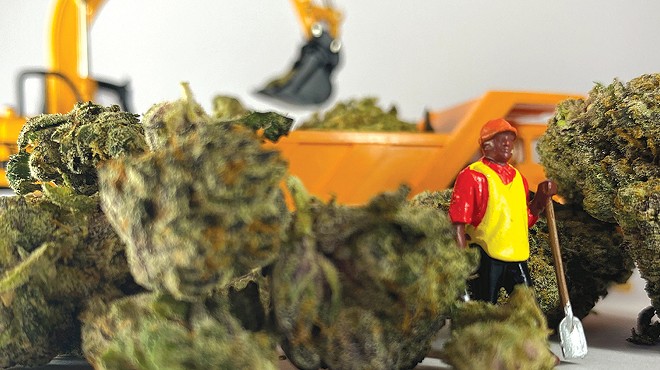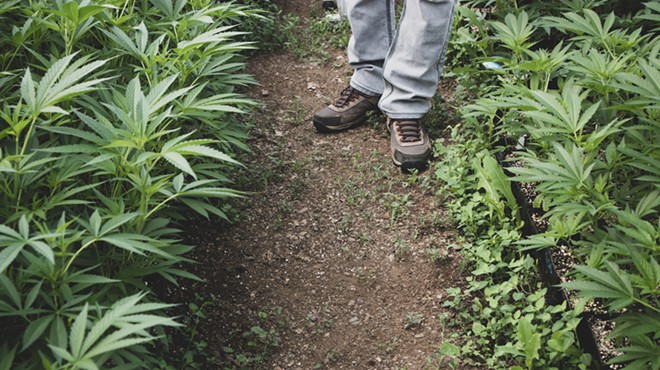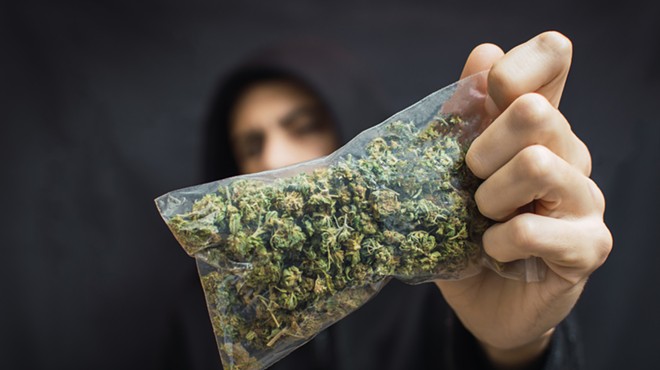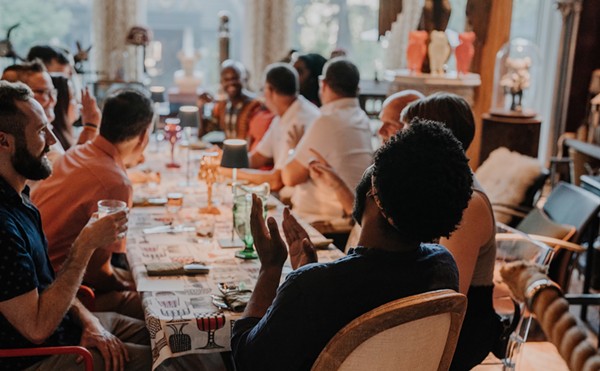Marilyn Manson must have predicted the future of legalized cannabis when he sang, "We're all stars now, in the dope show."
That's according to James Meyers, an architect, farmer, and cannabis grower living in Detroit. Meyers is the owner of ROI Urban Farms, which includes a biodynamic marijuana grow operation off W. Chicago Boulevard and a homestead near Palmer Park.
"The industry is like the dope show," Meyers tells Metro Times. "Nobody cares about quality. You've got Snoop Dogg and all these famous people, huge companies, and everyone just wants to be a star. Nobody really cares about what they put in their body. When it comes to the recreational, habitual user, all they're looking for is drugs instead of self."
Everything — including the watermelons, bananas, vegetables, and cannabis grown between Meyers's homestead and grow operation — is planted in soil made from compost using horse manure from Detroit's Mounted Police Division in Palmer Park. The Chicago Boulevard facility, just off the forthcoming Joe Louis Greenway, is the first USDA National Organic Program and Demeter Certified biodynamic compost operation in Michigan.
Yet despite his dedication to growing clean cannabis, Meyer hasn't been able to sell an ounce of weed to any Michigan dispensaries.
"All of the dispensaries that we've gone to and tried to develop a relationship with, none of them want our product on their shelves," Meyers says. He says they've opted to stock products parading as organic without the proper certifications instead. "All the people that front that they're organic are B.S."
Meyers says some dispensaries have cited the potential smell as a reason not to buy his product since the plants are grown with horse poop compost, but we didn't smell anything odd when we visited the operation.
Weed, weed everywhere
Michigan’s cannabis industry has exploded since voters approved Proposal 1 in 2018, with more than $1.8 billion in sales reported in 2022. But it turns out there can be too much of a good thing: in this issue, we look at some of the problems caused by the state’s glut of ganja.
• Cannabis growers and regulators confront Michigan’s oversaturated market
• Michigan cannabis industry employees say they’re being left behind
• Is there room for Detroit-grown organic biodynamic cannabis in Michigan's saturated market?
There's an abundance of weed in Michigan, but for Meyers, growing marijuana is spiritual work.
The concept of biodynamic farming is based on a series of 1924 lectures by Austrian occultist and philosopher Rudolf Steiner. It combines organic farming with esoteric practices like spraying the plants with ground quartz crystal and harvesting during the full moon. Meyers feeds his plants with biodynamic preparation #500 (manure), #501 (silica prepared with quartz powder), and #508 (horsetail tea).
These methods are thought by biodynamic farmers to enhance the life of the soil, strengthen photosynthesis, and prevent fungal disease, though some say biodynamic farming has no scientific merit.
"Biodynamic farming is a spiritual renewal to the foundations of agriculture. I always tell people that my boss is the holy spirit, Mother Nature. That's who I work for," Meyers says. "The moon regulates the levity or density of water in all living things so as [the plants] rise up to the full moon, it pulls all the water into the top of the plant. We harvest every full moon while we have all of that activity and water in the flowers."
Yet the next full-moon harvest at ROI Urban Farms may be its last — Meyers says he hasn't made any profit from indoor cultivation, and he's listed the grow building for sale.
He tells us he's "spiritually invested over $2.5 million," which includes paying his employees a minimum of $20 an hour.
"I didn't give up my caregiver's license, so I have one or two people a week who need to have an ounce of something to help them with their pain, but there's been no [return on investment] other than karma, which I guess is kinda beautiful," he says. "After our next harvest in May, we're not going to grow indoors anymore. I've got a $1 million facility that I've spent hundreds of thousands of dollars to make real nice that's up for sale now. We just can't continue to do this. People think I'm crazy for continuing this long."
Meyers started growing vegetables in Palmer Park in 2009 and then began cultivating cannabis at his homestead as a caregiver a year later. He purchased the building now used for his indoor grow five years ago, hoping Detroit would approve recreational-use cannabis after Michigan legalized it in 2019. By the time the city finally passed its recreational cannabis ordinance in 2022, following years of lawsuits and controversy, it was too late for Detroit growers like Meyers to compete. Meyers got a Class B license to grow up to 500 recreational plants in October.
An oversaturated market has left the state with plummeting prices and small growers struggling to stay afloat. The average price of an ounce of flower has dropped to $80, according to the Michigan Cannabis Regulator Agency, a drop of more than $430 from three years earlier.
Meyers plans to continue growing his Sun + Earth-certified cannabis outdoors at his homestead. It's the first such certified regenerative homestead farm and compost facility in Michigan. The Sun + Earth certification is given for cannabis that is "grown under the sun, in the soil of mother Earth, without chemicals, by fairly paid farmers," according to the organization's website.
"I'll still grow at the homestead in the hopes that maybe the market might change, but come October, if it doesn't, we're not even going to renew our license," he says. "You can't grow cannabis indoors, pay the city fees, pay for the licenses, do everything legally, and sell it for $800 a pound and make a penny. That's all they're offering people."
Seeing a grim-looking future in the cannabis industry, Meyers is looking to focus more on projects that benefit the greater Detroit community.
He says he is working with Grosse Pointe Park Mayor and Belle Isle Conservancy President Michele Hodges to build a botanical garden at Belle Isle. ROI Urban Farms also provides produce to The Congregation and has planted fruit trees and shrubs around the coffee shop.
"If we can't get some cash flow, there's just nothing more to do," he says. "I'm gonna go back to landscape architecture. My background is in landscape architecture, system design, and planning. I kind of walked away from that career to do something spiritual, I thought, for the citizens of Detroit... At least the kids that go to Gordon Park [across the street from The Congregation] can eat the strawberries, raspberries, and boysenberries and it's there for the families to enjoy."
Coming soon: Metro Times Daily newsletter. We’ll send you a handful of interesting Detroit stories every morning. Subscribe now to not miss a thing.
Follow us: Google News | NewsBreak | Reddit | Instagram | Facebook | Twitter

